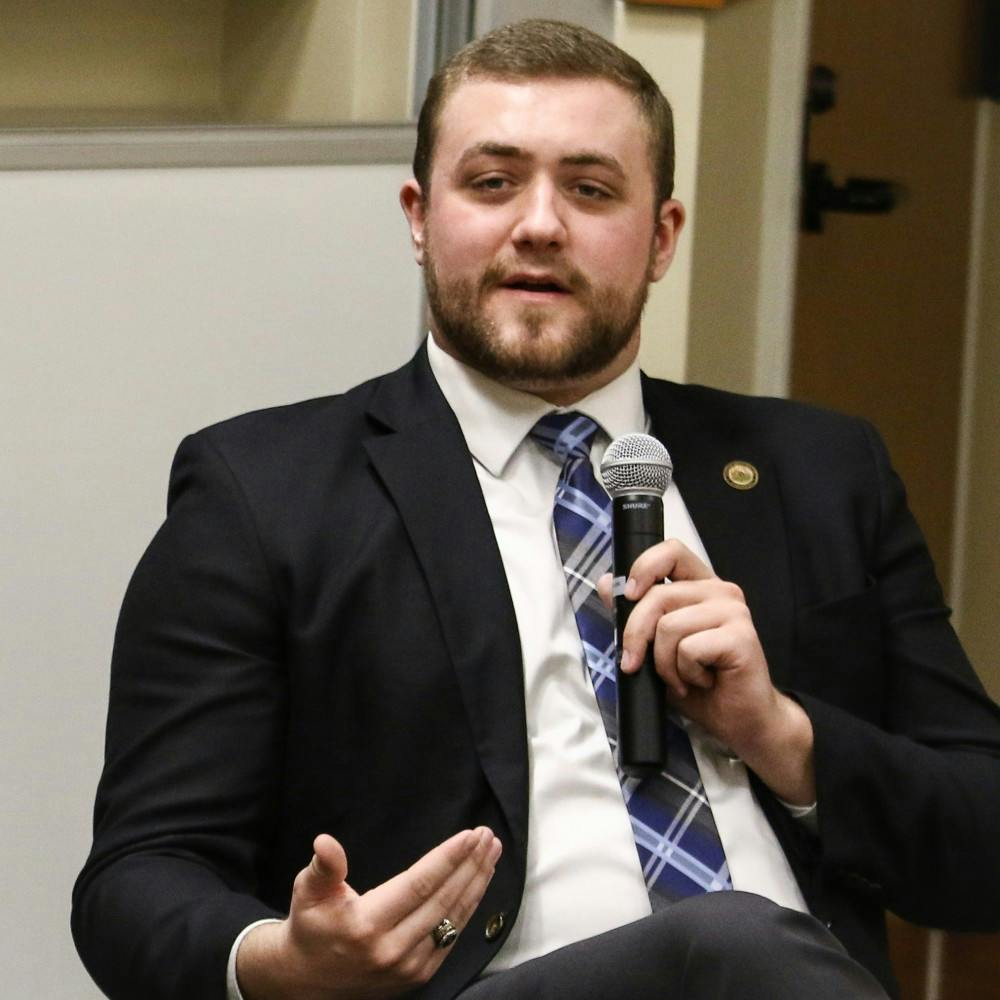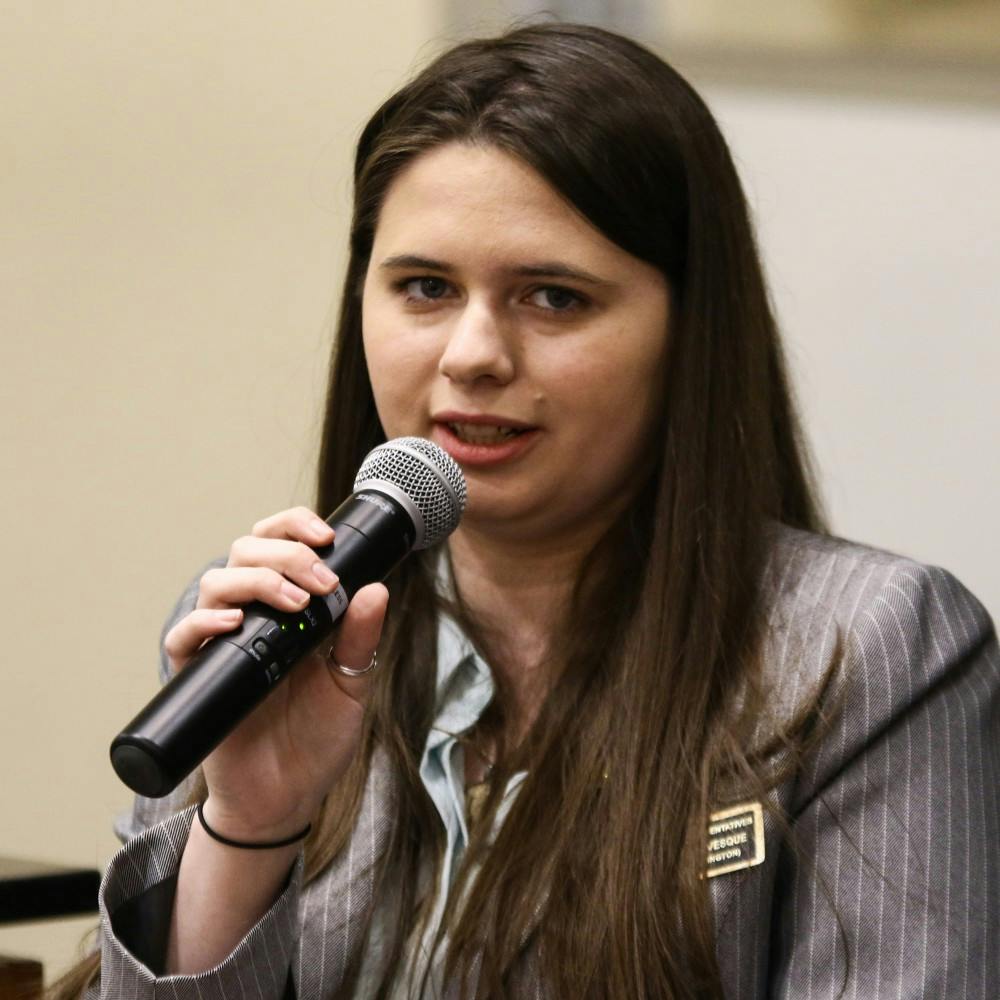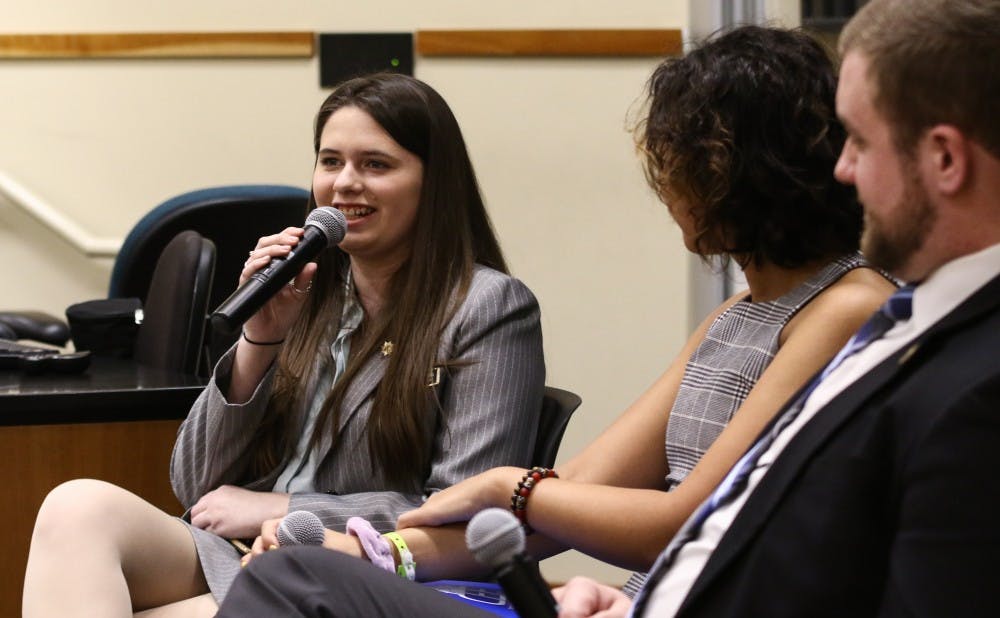Cassandra Levesque, 19, and Garrett Cole, 21, are two young politicians whom Duke's POLIS brought to campus this week. Levesque is a state legislator in the New Hampshire House of Representatives, and Cole is a county commissioner in West Virginia.
The Chronicle sat down with the two to talk about the benefits and challenges of being a college-aged elected official. The interview has been edited for length and clarity.
The Chronicle: What got you involved with politics at such a young age?
Cassandra Levesque: I started out with advocating to end child marriage up in New Hampshire, and started when I was 15 and a half. I’m still trying to fight it. I made one step closer [by bringing the age up to 16]. I was 18 when I got asked to run by state Rep. Ellen Read. I decided the Thursday before the deadline to run and signed all the papers. I never really thought I would be into politics. I was an arts student. I was going to go to an arts school. Things kind of changed and I switched to political science.
Garrett Cole: I’m a fifth-generation Nicholas County-an, always like to brag about that. We were around before the Civil War. I grew up a partial caretaker for two of my grandparents—one I lost, and one I’m fortunate enough to still have. I’m an Eagle Scout with the Boy Scouts, I got really in tuned to the local part of life. I was part of an unsuccessful county commission race in 2014—didn’t even know what a county commissioner was, which is kind of embarrassing now that I am one.
In 2016, I was a field representative 11 counties wide for a congressional race that we won with about 76 percent of the vote. I was actually going to do a write-in campaign that year but I realized that wouldn't work. I called my friend and he told me that was the wrong district.
But two years later I could, so June 7, 2017 I pre-filed, still didn’t know what I was doing. I’m paid $39,000 a year and didn’t even know that until I won my primary. I saw it as an opportunity to serve locally. I was too young to be a congressman, probably wouldn’t fit in very well anyway. [State legislative races] are every two years, and I wanted to be able to get my feet wet and go, and not have to run for re-election again. I’m serving a six-year term, and I get to be an advocate for Nicholas County.
TC: What’s it like serving in these roles when your friends are probably off at college? What are the conversations like with them?
CL: It’s definitely an interesting conversation because a lot of my friends are artists or they went to the University of New Hampshire at Manchester. They kind of knew that I was interested in that, but they always knew I was a photographer and not interested in politics. So going from that, two totally different things, and they were very excited that I was running. They were very supportive. It was mostly my family who was very shocked because no one in my family was interested in politics before me.
As I started getting more into it, we started talking more about it. It was totally out of the blue. I’m like the black sheep of the family now. I do everything differently from them. [I have] very interesting conversations with my family. All my friends ask me questions. I actually got a sewing circle that my aunt is a part of in Florida to go out and vote.
It was a shock for everybody that I decided to run, because it was not really on my radar until Ellen [encouraged me].
GC: My first year of high school I got elected class president before I even knew it. I was sitting in first block and they got on the morning announcements and they said “Freshman president: Garrett Cole.” I looked around and said “What did you all do to me?” I was a four-term class president, and I was an Eagle Scout—you know, Mr. Goody Two Shoes. I was a hunter, fisher—all that kind of good stuff. I did radio in high school—I have the voice for it, and the face too.
Anyway, so when I put my name on the ballot, none of my friends were really surprised. My family was shocked, I can definitely relate there. My parents thought I was going crazy. Everybody just kind of fell in line, like “How can we help?” I registered so many young people my age to vote. It was surprising [how few were registered] but it’s not. There’s a lot of discontent in politics and young people just don’t want to get involved. I’d like to kind of think that I tried to help with that on the local level. At least understanding county government, and hopefully getting out to vote.
TC: What was it like organizing a campaign so fresh out of high school?

CL: It was very interesting, but since I was in Girl Scouts, going door to door and talking with people was very normal. What was more scary was asking people for money, even though I already did that with cookies. It was very scary. I had no idea how to do it and I was very nervous. But I just posted on Twitter and Facebook, “Donate $3.” Next thing I know, I had a lot of followers at that point and it’s increasing, one person tweeted it out. I got a lot of donations through that, going to a lot of events and meeting people…Everybody knows everybody, so that helped a lot.
GC: That was one thing I was fortunate with. West Virginians are too filled with pride for our own good—I actually never asked for a campaign contribution. But whenever someone would ask if I needed one, I would definitely take them up on it. I put in $8,000 myself on a $16,000 campaign. I went door to door [to campaign]. I would go to parades in my pickup, with a brand new Yamaha sound system blaring “Takin' Care of Business.” Even the county Democratic party chairman was dancing along when I drove by. We had fun with it. I shook every hand I could. People would get mad at me for not shaking their hand, when the truck would get ahead of me and I had to catch up.
At the “meet the candidates” and stuff, I would show up with seven binders full of the state code, state constitution, how to run a county budget. The state auditor’s print-offs, all that kind of stuff. Just trying to be prepared, really. Everybody is going to talk about my age, so I’m not going to waste my time with it. I’m going to talk about the issues and I’m going to prepare myself, and I’m going to treat it like a job and not an occupation.
TC: How do the politicians you work with react to your age?

CL: A lot of them are very excited that I’m there, because I give them a new perspective. I give them a new voice in the New Hampshire House, so that helps a lot. I have met a lot of great people so far, and they’re very supportive that I’m there. They’re very helpful and very protective.
It is a lot of fun there, it’s not just everyone arguing. There are times where it’s arguing, but for the most part we can agree and we can work together.
TC: How do you balance college with politics?
CL: I do online school for political science, so that helps a lot. I only do one class per month. I just finished up one class and am now getting into the political science classes. Since I do film photography, I’m trying to find a darkroom. I try to take pictures whenever I can.
GC: I actually transferred closer to home. I was driving two hours each way to college, and I’ve never lived in a dorm. I’ve commuted the whole time because I was looking after my grandparents. We have a family farm, and my girlfriend has a family farm and a logging business. I do a little bit of all that. I’m still pulling a 15-credit-hour semester—three online, two in class. My professors are very forgiving. I’ll usually have my textbooks set up on one side and my MacBook on the other, so I’m either doing classwork or commission work at once.
TC: What do you see as your future in politics?
CL: I have no idea. I just jumped at the chance, and I want to see where it takes me. I’m a freshman [in college]. I’m just trying to figure things out right now.
GC: I’ve got a six-year term, so I’ve got plenty of time to think about it. I’ve thought about a second term. A cousin of mine was the last Republican governor we had, in the late 1990s… So the governor’s office has always interested me, but really as a commissioner it is part of my responsibility to go to the state house and pick on people like Cassandra, and really just advocate for counties. Right now I’m operating in a manner like I’m going to be a one-termer. I’m going to get as much done as I can, and then once it comes close we’ll see what happens. I’m not afraid to go back to the farm. I enjoy the farm much more than I do politics, but if I feel led to run again or run for something else or I’m encouraged to do so, I’ll consider it.
Get The Chronicle straight to your inbox
Signup for our weekly newsletter. Cancel at any time.
Bre is a senior political science major from South Carolina, and she is the current video editor, special projects editor and recruitment chair for The Chronicle. She is also an associate photography editor and an investigations editor. Previously, she was the editor-in-chief and local and national news department head.
Twitter: @brebradham
Email: breanna.bradham@duke.edu

